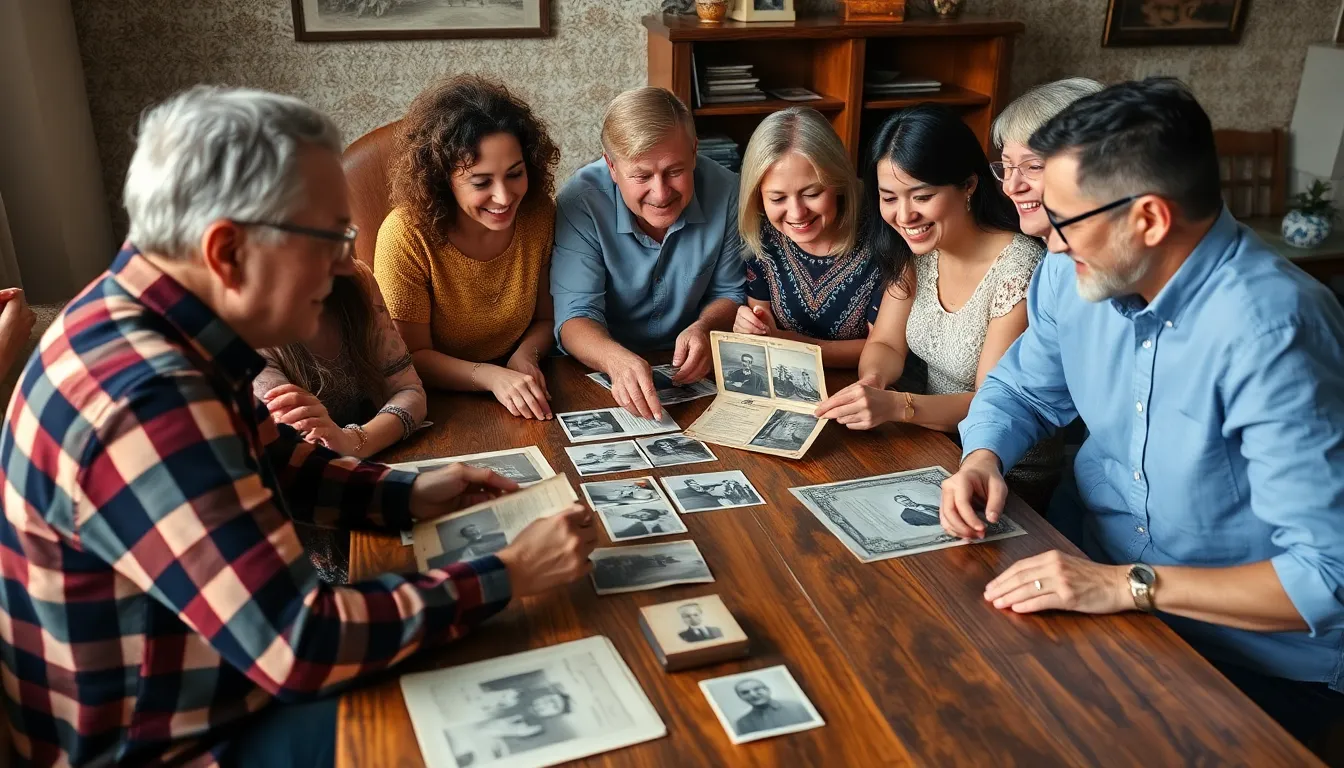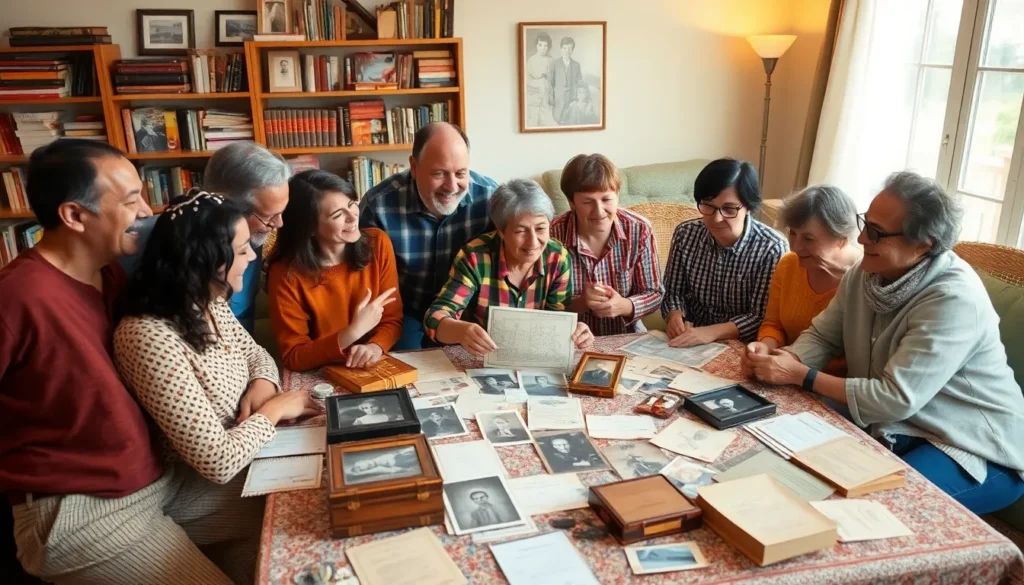Table of Contents
ToggleUnraveling the tangled web of family genealogy can feel like embarking on a treasure hunt—only instead of gold, you’re digging up long-lost relatives and quirky family stories. Imagine discovering that your great-great-grandfather was a pirate or your aunt once won a pie-eating contest. Family trees are more than just branches and leaves; they’re a wild ride through history, filled with characters that could rival any soap opera.
In a world where everyone seems to be related to someone famous, tracing your roots can be both a fascinating and hilarious journey. Whether you’re looking to impress at family gatherings or simply want to understand where you came from, delving into genealogy opens doors to a past rich with surprises. So grab your magnifying glass and let’s dive into the delightful chaos of family history—who knows what family secrets might be lurking just around the corner?
Understanding Family Genealogy
Family genealogy involves tracing lineage and understanding connections among relatives. It’s a way for individuals to learn about their ancestry and the stories behind their family history.
Definition and Importance
Family genealogy examines bloodlines and their historical significance. This area of study reveals unique stories, migration patterns, and cultural influences. Researching genealogy enriches personal identity by showcasing heritage and individual roots. Understanding ancestry strengthens family bonds, connecting past and present through shared narratives. Knowing one’s lineage promotes appreciation for family traditions, values, and accomplishments.
Historical Context
Historically, genealogy holds deep roots in various cultures. Many societies, including ancient civilizations, maintained records of lineage to assert social status or inheritance rights. Lineage documentation often highlights connections to historical figures or significant events. In recent centuries, advancements in record-keeping, such as census data and church registries, enhanced genealogical research. Today, online databases and DNA testing further simplify the exploration of family histories. Understanding these historical aspects provides context for individual genealogical journeys.
Researching Your Family Tree

Researching a family tree involves systematic collection and organization of data. Start with immediate family members to gather basic information such as names, dates, and places of birth.
Gathering Information
Collect documents like birth certificates, marriage licenses, and obituaries. These records provide critical details about relatives. Talk to family members, as they might share stories or insights that aren’t documented. Asking open-ended questions encourages them to reminisce about their childhood or relatives. Another approach involves examining family heirlooms, which may reveal connections to ancestors. Organize the gathered information in a consistent format to simplify further research.
Tools and Resources
Numerous tools streamline genealogical research. Online databases such as Ancestry.com and FamilySearch.org offer vast records and user-uploaded family trees. Additionally, local libraries often hold archives of historical records. Genealogical software programs grant users the ability to create and manage their family trees efficiently. DNA testing services like 23andMe provide genetic insights that might lead to new connections. Utilizing these resources enhances the research process, uncovering more about one’s family history.
Techniques for Tracing Ancestry
Genealogical research combines various methods to unveil family histories. Utilizing advanced strategies enhances the search for one’s roots.
Genealogical Software
Genealogical software simplifies the process of organizing and managing family data. Tools like Family Tree Maker and Legacy Family Tree allow users to build family trees, store records, and access various features. These applications often enable users to document vital information, such as birth and death dates, creating a comprehensive family narrative. Many software options integrate with online databases, facilitating access to historical records. Reports and charts generated by these tools help visualize relationships, making the data more accessible. Overall, software serves as a valuable asset for both novice and experienced researchers.
DNA Testing
DNA testing offers a scientific approach to tracing ancestry. Services like 23andMe and AncestryDNA analyze genetic information to connect individuals with potential relatives. Each test provides insights into ethnic backgrounds and migration patterns by comparing DNA against vast databases. Users benefit from discovering unknown family connections through matched DNA segments. Moreover, the results can validate traditional genealogical research, confirming paper trails or uncovering new branches of the family tree. Genetic testing represents a modern technique that enhances understanding of family lineage and shared heritage.
Common Challenges in Genealogy Research
Genealogy research presents various challenges that can hinder the pursuit of family history. Addressing these obstacles requires persistence and strategic thinking.
Dealing with Incomplete Records
Incomplete records often present significant hurdles for genealogists. Many vital documents like birth, marriage, and death certificates may be missing or lost over time. Searching through local archives can yield partial information, which complicates lineage tracking. Alternative sources such as newspaper articles or church records might help fill the gaps. Utilizing online platforms often uncovers additional clues, so these resources should be prioritized. This approach helps in piecing together diverse aspects of family history despite record limitations.
Overcoming Obstacles
Overcoming obstacles in genealogy research involves proactive problem-solving. Common challenges include language barriers, especially when analyzing records in foreign languages. Understanding local customs and naming conventions also plays a critical role. Collaborating with other researchers can lead to sharing insights and strategies, making the process smoother. Engaging with genealogical societies proves beneficial for accessing expert knowledge. Flexibility and creativity lead to uncovering solutions, allowing genealogists to navigate even the trickiest situations.
Tips for Successful Family Genealogy
Successful family genealogy relies on effective strategies. Organization and planning set a strong foundation for research efforts.
Organization and Planning
Start by creating a clear framework for your family tree. Collect details from immediate family members first, documenting names, dates, and places. Utilize genealogy software to streamline data entry and organization. Establish a filing system for vital documents, such as birth certificates and marriage licenses. This method preserves records and enhances accessibility. Create separate folders for each family branch to avoid confusion. Regularly update your findings to maintain accurate and comprehensive records. Planning encourages a thorough approach, guiding research toward specific family lines.
Connecting with Others
Engagement with fellow genealogy enthusiasts fosters community and shared knowledge. Join local genealogical societies to access resources and support. Participate in online forums and social media groups dedicated to genealogy. Connecting with relatives can unearth hidden family stories and documents. Reach out to others researching similar surnames for collaboration opportunities. Collaborating on projects can reveal connections and break through research barriers. Attending genealogy workshops can provide valuable insights and methods. Building relationships with historians or archivists can lead to access to additional records.
Exploring family genealogy offers a unique opportunity to connect with the past and understand one’s heritage. The journey not only uncovers fascinating stories but also strengthens familial ties through shared histories. With the right tools and resources, anyone can embark on their genealogical adventure and discover the rich tapestry of their ancestry.
By embracing modern techniques and collaborating with fellow enthusiasts, individuals can navigate challenges and uncover hidden narratives. Ultimately, the pursuit of family genealogy is more than just research; it’s a meaningful way to celebrate identity and honor the legacy of those who came before.




